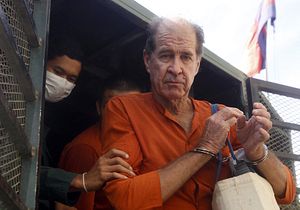The recent guilty verdict in the long running espionage trial of Australian filmmaker James Ricketson, who was arrested last year for flying a drone over an opposition political rally without a permit, is troubling on several fronts with respect to how justice is meted out in Cambodia.
The precedents evident in the handing down of the six-year jail term sentence are extraordinary. Prosecutor Seang Sok did not name the country the 69-year-old spied for, no witnesses were produced, nor was there any proof that he was paid to collect information or a clear establishment of motive.
Instead Seang Sok produced a small batch of emails that were found after investigators seized Ricketson’s computer and combed through 15,000 emails and 1,600 pages of files. One included information about Hun Sen’s bodyguard unit, while another was about an arrest warrant for the former opposition leader Sam Rainsy. All of it was public knowledge at any rate.
That will put even more scrutiny on the case and what it means for how justice is carried out in Cambodia. Since Ricketson’s arrest last June and his charge under Article 446 of the Cambodian penal code for espionage, the case has attracted widespread international attention.
However, at the trial, Ricketson admittedly did not help himself either. His time on the stand was in some ways self-incriminating. For instance, Ricketson openly admitted his personal sympathies for the banned Cambodian National Rescue Party (CNRP), which refused to accept the 2013 election results.
That associates him with a string of developments in Cambodia that were eventually used to justify a rising crackdown by the government. Following the violent demonstrations known as the Cambodian Spring, the government of Prime Minister Hun Sen accused the CNRP and Sam Rainsy of fomenting a rebellion designed to overthrow his government. The CNRP was dissolved by the courts, its leaders fled, and a crackdown on the media followed. That became known as the Repression and resulted in Hun Sen’s party winning all 125 seats in the National Assembly at the latest poll, held in July.
Throughout, Ricketson’s personal political sympathies did appear to compromise his independence as a professional journalist, a key plank in his defense. The court heard the drone footage had captured troop deployments, and that he had offered the footage to Sam Rainsy.
In addition, he wrote letters to then-Australian Prime Minister Malcolm Turnbull criticizing Hun Sen and had opinion pieces vetted by the CNRP, talked up the Cambodian Spring, and had offered his services as an election campaign adviser.
His friends and family are aware of his weaknesses. He can bully himself in, risks becoming slightly maniacal when he doesn’t get his way, and has trouble listening to others – even if it’s about what’s best for him when locked up in a Cambodian prison.
But as his defense lawyer argued, Ricketson, with a long history of charity in Cambodia, was entitled to his political beliefs, and his work as a journalist had not damaged Cambodian security as alleged in the charges.
There has been a steady exodus of Western expats since the Repression began almost a year ago. Exactly how many is impossible to tell, and any net number would be obscured by other trends such as the arrival Chinese workers in the tens of thousands.
That exodus will have a direct impact on the Cambodian economy and on the lives of many Khmers who have built relationships, relied on aid programs, and prospered from the likes of Ricketson, who used his meager earnings to fund his own charity work.
Ricketson must now decide whether to appeal the decision. Should he follow that route, another lengthy legal process will ensue, and given his current circumstances, is unlikely to succeed. If he decides to accept the verdict, he can then ask for a pardon and that might work given the diplomatic storm the verdict has whipped up.
Either way, his verdict and six-year jail term comes at a bad time for Cambodia. Its standing in the international community has been severely tarnished by the latest election and sanctions from the United States are pending and under consideration elsewhere. Ricketson has a well-honed reputation as a difficult person, and the Cambodian authorities are finding out why.
Luke Hunt can be followed on Twitter @lukeanthonyhunt

































